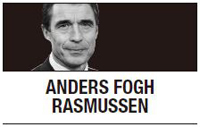
Geography aside, Japan and the European Union have never been so close. With Europe’s long-standing transatlantic ties under strain, and China presenting a challenge as well as an opportunity, the EU has sought like-minded allies in the Pacific. And there is none better than Japan.
The EU-Japan bond transcends mere interests: It is a relationship based on shared values of freedom, democracy and open markets. Today, these values are under threat. The United States has decided to transact with the world rather than lead it, while China is challenging democracy in its neighborhood and rewriting the international rulebook that is designed to maintain peace and global stability.
Faced with Chinese revisionism and the global retreat of the US, Europe lacks the geopolitical strength and unity to assume America’s mantle as defender of the rules-based multilateral order. Europe therefore needs friends like Japan, and it is now time to take the bilateral relationship up a gear.
Fortunately, the EU and Japan have already laid important groundwork. Their recent free trade deal, along with a growing strategic partnership, sends a signal to isolationists everywhere. Some 74,000 EU companies -- 78 percent of which are smaller firms -- currently export to Japan, and 550,000 people in the bloc work for Japanese firms. The trade agreement between two of the world’s four largest markets will therefore strengthen a mutually profitable relationship.
Europe and Japan should now build on this through joint initiatives in areas of shared interest. Four areas, in particular, stand out: global trade, data and digital norms, investment in Africa, and connectivity in Asia.
The first of these concerns is the World Trade Organization, which is in serious need of reform. True, the WTO’s core principles remain sound, despite what some world leaders say. But the organization’s machinery needs updating in the face of China’s attempts to rewrite global rules so that its state-backed monoliths can dominate industrial sectors across Asia, Africa and Europe. America, meanwhile, has responded by instigating trade wars that only produce economic losers. The EU-Japan trade agreement, on the other hand, shows that there is a more positive, growth-enhancing way forward.
In fact, reciprocity should underpin all of Europe’s trade and investment relations. We want to trade with China, but on fair and equal terms, and without being naive about how China is buying strategic assets and technological know-how in order to build up influence in several EU member states. In Europe, we have only just begun to wake up to this risk.
As for digital rules, the EU and Japan have aligned their standards on data flows. That has resulted in an “adequacy decision” allowing the free flow of data, while giving citizens control over personal data.
In the next few decades, the further diffusion of artificial intelligence, facial recognition technology and 5G mobile networks will make these challenges existential. In the 19th century, whoever controlled the seas controlled the world. In this century, the world will be ruled by whoever sets global digital norms -- and it must be democracies that do this. Here again, the EU and Japan are exactly where they should be: at the forefront of setting beneficial global standards.
The EU should therefore embrace the proposal of Japanese Prime Minister Shinzo Abe to use the EU-Japan agreement on data flows as a gold standard on which to build a global accord. The United Kingdom’s government is also working on such an option for its post-Brexit arrangements, thereby providing a critical mass with which to bring the US on board. This emerging “digital democratic caucus” should work to prevent China from recoding the internet to suit its authoritarian ways.
In Africa, China brings a checkbook while Europe brings a rulebook. Whereas the EU and International Monetary Fund apply strict conditions to their investments, China’s demands are far less transparent. As a result, China has become a lender of first resort for many African countries, creating client states in the process.
Many EU member states have historical links and obligations to Africa, but it is also in Japan’s interests to invest in the continent’s development. The EU and Japan have a common desire to see Africa develop open, free market economies governed by the rule of law. We should find new ways to cooperate in this area.
Likewise, Europe should support efforts to improve connectivity among democratic allies in the Indo-Pacific region. In particular, the important Indo-Pacific Economic Corridor project aims to bolster Asia’s major democracies by strengthening the infrastructure of commerce and exchange. It therefore stands in clear contrast to China’s Belt and Road Initiative, which is driven purely by self-interest. Just as investing in Africa is in Japan’s interests, so is European investment in Indo-Pacific connectivity.
The EU is trying to become more sovereign in a world where it feels squeezed between two great powers with competing models. Given strong geopolitical headwinds, there are growing calls for a “Fortress Europe” based on protectionism and strategic retrenchment. But the opposite must happen: Europe cannot be sovereign unless it leads by uniting like-minded allies to defend our common interests.
I have long argued that Japan is a critical partner in the global fight for freedom and democracy. As NATO secretary-general, I was proud to sign a partnership agreement with Abe. To me, this was more than a simple agreement: it was a sign that democracies should stand together in the fight against autocracy.
Today, the EU and Japan must make that stand. Deepening our mutual friendship represents the best chance for the democratic world.
By Anders Fogh Rasmussen
Anders Fogh Rasmussen, a former NATO secretary-general and former prime minister of Denmark, is chairman of Rasmussen Global. -- Ed.
(Project Syndicate)





![[Weekender] Korea's traditional sauce culture gains global recognition](http://res.heraldm.com/phpwas/restmb_idxmake.php?idx=644&simg=/content/image/2024/11/21/20241121050153_0.jpg)


